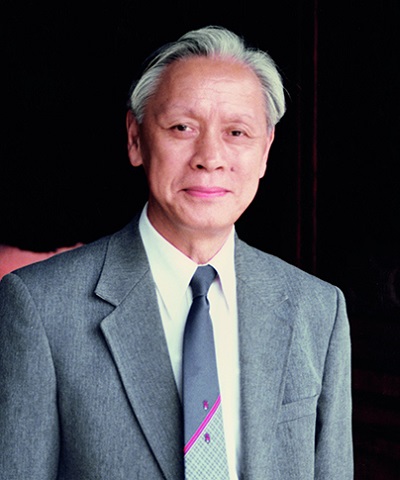Grandpa Gu Fangzhou’s life with sugar-coated pills
For many people, the memories of taking sugar-coated pills are full of sweetness. But few of them knew that, behind the little pills are the hard times in which a doctor committed his life to research in combating poliomyelitis.
In 2000, the signing ceremony of the report confirming China's elimination of poliomyelitis was held at China's former Ministry of Health. Gu Fangzhou, 74, signed on the report as the representative.

A file photo of Gu Fangzhou. [Photo/Xinhua]
However, when he started research in infantile paralysis, he never thought it would become his lifelong career.
On the occasion of the 70th anniversary of the founding of the People's Republic of China, Gu Fangzhou, a virologist and a former president of the Chinese Academy of Medical Sciences and Peking Union Medical College, was honored as a People's Scientist.
Racing against time as death toll
Let's look back to the year 1955.
Poliomyelitis broke out in Nantong, Jiangsu, East China's Jiangsu province. A total of 1,680 people were suddenly paralyzed, most of whom were children. The virus spread rapidly to other cities, including Qingdao, Shanghai and Nanning.
According to Ms. Li, Gu's wife, there were parents running around with their children at the beginning of the outbreak, but Gu could only say that he had no way to treat it.
This always affected Gu. At that time, there were 10 to 20 million newborns every year in China, and Gu knew clearly that the earlier vaccines could be developed the more children would be saved.
There were two technical methods in the world at that time — "dead" vaccines and "live" vaccines. Wang Chen, president of the Chinese Academy of Medical Sciences and Peking Union Medical College, said that under those circumstances, choosing the death vaccine was preferable in the aspect of personal gain and loss.
Dead vaccines were produced under fully-developed technologies, but immunization required three injections, a few tens of yuan a shot, and a fourth shot was needed after a period of time.
It was difficult to ensure that all the newborns could get vaccinated in a safe manner based on the country's overall strength at that time and the shortage of medical professionals.
After careful consideration, Gu made up his mind to promote live vaccines in China. A research team on polio live vaccine headed by Gu Fangzhou was subsequently set up.
Testing under unknown risks
Gu's team then established an institute of medical biology in Kunming. A vaccine lab began researching protection of children's health in the caves in the city's outer suburbs.
Gu led his colleagues to dig caves, build houses, and the lab started from scratch.
The first phase of the vaccine trials needed efficacy tests on a few people, which meant that the test subjects would face unknown risks.
With no hesitation, Gu and his colleagues decided to do the tests on themselves. One week after drinking the vaccine solution, Gu's vital signs were stable and there was nothing wrong with his health.
Sweetness of“sugarballs”remaining in memories of Grandpa Gu
At the end of 1960, the first batch of vaccines for five million people was promoted in 11 cities across the country. In these cities, the epidemic outbreaks were gradually contained.
Even with the improved situation, Gu did not cease his research. He realized that it was hard for many regions to ensure the storage conditions, and the method of ingestion also needed to be advanced.
After repeated experiments, Oral Poliomyelitis Vaccine (OPV) in sugar coated pills was developed.
In 1990, the national immunization program of poliomyelitis began and the incident rate dropped sharply in the following years.
Since the discovery of the last polio patient in 1994, no cases caused by the indigenous wild virus have been found.
On Jan 2, 2019, Gu Fangzhou passed away in Beijing. People began to search for the sweet flavors of the sugarballs of their childhood memories.
Some says that Gu Fangzhou is more of a "academician" than a real academician, but Gu said "I only did one thing in my life, making a small sugarball.”
